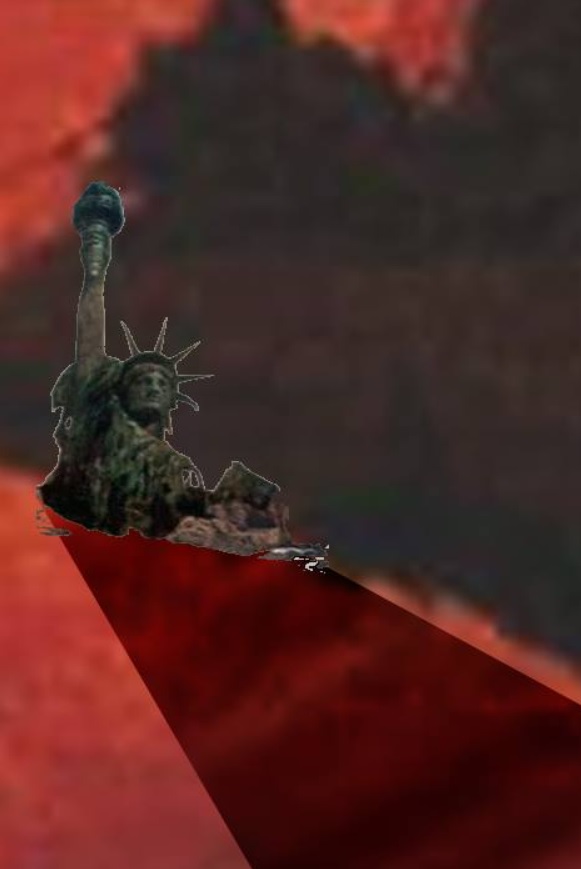
¹⁸ I wrote all of On the Internet at my desk, sitting upright with my laptop open. This morning, sitting more casually on my bed reading something on my phone, I realised that the position of the phone screen varies far more than that of the laptop or desktop computer screen. It wouldn't be accurate to say, in 2021 (when most people's access to the internet as a medium now happens via mobile devices) that the “above / below” metaphor is somehow less abstract, because whether or not the “above” and “below” actually refer to the real concrete positions of text one has already read and is yet to read, respectively, depends on how one holds ones phone.¹⁹ In my case, sitting on my bed and positioning my phone screen approximately at a tangent to the curve of the Earth, the text I had already read was not above, but stretching out in front of me. The text I was about to read imminently was in the space between my phone and my chest, and text further down the line was positioned roughly inside my body and finally out of the other side stretching away behind me.²⁰
¹⁹ The Pirahã people do not orient themselves according to relative direction²¹—they have no conception of a left or right foot. They use absolute direction. Languages without words for relative positions are rare but not as uncommon as those without numbers or recursion: many Australian Aboriginal peoples use cardinal directions exclusively instead. One might be said, therefore, to have a north foot, and which foot this would refer to would depend on whether you stood facing east or west. The Pirahã specifically—and in a manner I find inspiring and fascinating—dispense even with cardinal direction. Their system of direction uses the environment only as the reference point for their relative orientation: ones feet can be identified by their position relative to the river, or the camp, or even the sun. Since they live in impermanent camps and move from place to place along the Amazon this means that their system of orientation is relative not just to positions in an absolute space, but also in time. One might stand still for a number of hours and find that ones sun foot has swapped sides. This is a fascinating move to me because it suggests that the Pirahã have an intuitive understanding of the world that resembles dialectical materialism. The Pirahã do not have any creation myths, and prefer to think of the world as an objective and material one which is comprised of nothing more or less than everything one requires to live and be happy. Nevertheless, they understand tacitly that to be situated in this material world as an individual requires that descriptions of that world are not in themselves objective, but relative to specific sorts of situations.
²⁰ I take for granted that the phone screen, or indeed any screen which displays an internet browser, is a small window onto a longer strip of webpage. I imagine that, when I scroll around a long Wikipedia page, I am actually moving this giant, meters long document up and down behind my screen. In fact: the parts of the page one isn't looking at do not extend off the top and bottom of the screen. In the case of the long Wikipedia page, the document can only be said to exist as a webpage when it is rendered: the matter of the internet becomes real only in the eye of the beholder. The computer in fact operates by an idealist metaphysics.²²
²¹ In perhaps what reads as a pointlessly obscure move, I have so far referred to this phenomenon of relative direction as simply that: “relative direction”. In practise, the field of linguistics refers to this by the more specific name of “body relative direction”, because in the case of left and right we use the orientation of our own bodies as the reference point by which we make our relative calls. Some of the Western commentators on this phenomenon have stressed the importance of the individualist aspect of this practise, particularly when they are involved in discussions of comparison between neo-colonial and indigenous conceptions of direction. Indeed, “body relative direction” is sometimes known as “egocentric coordinates”. Up until very recently, there was to my mind one obvious line of attack against the notion that Western conceptions of direction are inherently egocentric.²³ “Body relativity” takes for granted that it is the body by which we orient our direction, but this is only the case for the two dimensional navigation of the surface of the land. Up and down, on the other hand, do not work in this way, and they are almost as important a part of our system of direction as left, right, forwards and backwards. As is pointed out in the Vsauce video I refer to above, our notions of up and down are relative not to our bodies but to the gravity of the planet. If I happen to be suspended by my ankles—something that I hope will happen more often in the wild techno parties which are to resume post-lockdown—I do not declare up and down to be reversed, because that notion is not dependent on my body but on the Earth.
²² In Time and Free Will, Henri Bergson takes great care to explain the fallacy of conceiving of time entirely in spatial terms. After the revelations of Einstein, his work is a little harder to take at face value, but I believe every argument involved still works; Bergson isn't so much concerned with the spacetime of relativity, but of the interior time of consciousness, in which the present is not a relative position on a spatial-temporal dimensional axis but a mechanism by which we experience stuff. Humanity has a long and illustrious history of interpreting time in spatial terms²⁴: when viewing long web-pages, we manage to make the delightfully unusual move of interpreting possibility in spatial terms. The raw, undifferentiated possibility of what might exist is intuitively understood as actually existing just outside of our frame of vision, and so we interpret the spontaneous creation of new material as simply the movement of matter in and out of our line of sight.
²³ Up until recently there was one obvious line of attack, now there is another. I refer of course to that of “phone-screen relative direction”. This is the spatial myopia brought on by the attention monopolising phone: when we are using the phone, we orient ourselves by it. Little else has the power to temporarily suspend our notions of left and right and up and down. In practise, the engrossing power of this device means that the ego in egocentric coordinates is obliterated, and even the all encompassing and irresistible gravity that informs the traditional reference point of up and down is temporarily suspended.
²⁴ In his book of aphorism, The Blind Eye, Don Paterson writes: “We fall in love; so our lover feels entitled to assume that when our feelings undergo any complex change, we have simply fallen back out again. The Greeks thought of their future as behind them, and their past in front where they could see it; how much human misery has been caused by the dumb and hubristic inversion of that wholly sensible model?”²⁵
²⁵ In the main body of On the Internet, I suggested Housefly as an example of a poetry for the internet, because it reflected the themes of non linearity, connectedness, and multimedia. I might also have suggested the newest literary form: the Tweet, which, in ample half-baked think-pieces from Vice interns, has been described as a sort of fusion of aphorism and poetry. The first, and greatest, of these Twitter poets is @dril. @dril, in a piece that lampoons the epic literary theme of Man VS God by underlining the absurdity of such a notion in a post Darwin world, whilst deftly alluding to the Greek conception of the future as lying behind us, writes: “IF THE ZOO BANS ME FOR HOLLERING AT THE ANIMALS I WILL FACE GOD AND WALK BACKWARDS INTO HELL”
On the Internet: Footnotes 25-32
